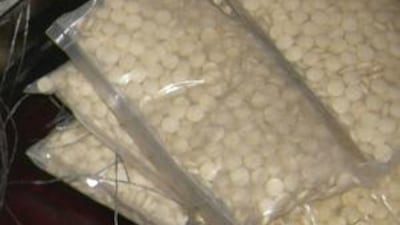The illegal drugs were hidden inside 152 industrial-sized spools of thread, packaged as though they would be sold for use in the textiles market. But as the spools passed through the scanners in Cargo Village at Dubai International Airport, inspectors with Dubai Customs started noticing that the density of wrapped thread varied from reel to reel. And that led to the seizure of a massive haul of the recreational drug, Captagon.
When the Customs officials cut open the first 850g spool, they found it was stuffed with tablets. Further testing revealed 651,000 pills of Captagon, or 104kg, in all. The haul, on Jan 27, dwarfed the 10-15kg amounts of Captagon that had been seized in the past, said Abdul Rahman al Saleh, the senior executive director of corporate affairs at Dubai Customs. "This is a huge quantity of drugs to come to the market," he added. "And the way it was brought in was very innovative."
Dubai Customs and Dubai Police do not put an illicit market - or street - value on drug seizures. However, during a 2005 raid in Turkey, authorities found two North Korean diplomats assigned to the Bulgarian embassy to be carrying half a million Captagon tablets. At that time the drugs, destined for the Arab market, were estimated to have a street value of US$7 million (Dh25.7m). Mr al Saleh would not name the country of origin, although he confirmed they came from within the region. An Arab resident of the UAE who was present as the packages were examined was arrested and referred to the Dubai Police's anti-drug department.
Brig Abdul Jaleel Mahdi, the director of the General Department of Combating Narcotics at Dubai Police, said the drugs were generally produced in "a country very close to here". "It's not the first time that Captagon pills have passed through the country,'' he said, "but it is more widespread in other neighbouring countries than it is in the UAE.'' Captagon is the brand name for a synthetic stimulant called fenethylline that was invented in the early 1960s. It was initially used to treat children with what is now known as Attention Deficit Hyperactivity Disorder and, to a lesser extent, adults with narcolepsy and depression. It was later banned worldwide.
Since 2000 there has been a rise in the use of Captagon - which is also produced in counterfeit form using other amphetamines - among youths in the Arab world who use it recreationally, to stay awake or as a weight-loss aid. Dr Ahmed Yousif Ali, the head of treatment and rehabilitation at the National Rehabilitation Centre in the capital, said last autumn that almost all of his patients had abused Captagon.
He warned of the side effects, explaining that it "sabotages the brain" and can keep users awake for days. Hamad al Ghaferi, the centre's director-general, said yesterday that there were still cases of people being treated for abusing Captagon. "It is one of the drugs, the medications that has been smuggled into the country," he said. In recent years the Middle East has been increasingly affected by the manufacture of Captagon, known locally as Abu Hilalain, according to the 2008 World Drug Report from the UN's Office on Drugs and Crime. When the report was released last autumn, its authors said there was no evidence such synthetic drugs were being manufactured in the UAE or the GCC, but rather in clandestine laboratories in Bulgaria, Turkey and Syria. But they do appear to have become drugs of choice in the region; in recent years the Middle East has seen its share of global seizures of synthetic drugs, including Captagon, amphetamines and Ecstasy, jump from one per cent to 25 per cent, according to the report. The size of the Captagon seizure in Dubai pales in comparison with others; in 2006, 14 tonnes were seized in Saudi Arabia and two tonnes in Oman. At the end of January four men were arrested after Dubai Customs seized 16kg of heroin that had been smuggled into the country in hollowed-out almonds. Earlier this month, Sharjah Police seized 1kg of heroin and 290g of opium and arrested three people from one family. amcqueen@thenational.ae * With additional reporting by Jessica Hume and Rasha Abu Baker

